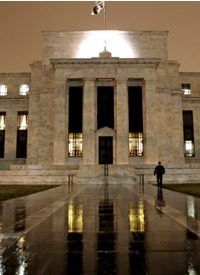
The high-profile international-business editor of the U.K. Telegraph, Ambrose Evans-Pritchard, shocked and pleased readers with an apology for his past support of the U.S. Federal Reserve System, its chairman, and its policies.
“I apologise to readers around the world for having defended the emergency stimulus policies of the US Federal Reserve, and for arguing like an imbecile naif that the Fed would not succumb to drug addiction, political abuse, and mad intoxicated debauchery, once it began taking its first shots of quantitative easing,” he wrote in the piece, entitled “Shut Down the Fed.” “Quantitative easing,” of course, is Fed-speak for creating new currency out of thin air.
“My pathetic assumption was that Ben Bernanke would deploy further QE only to stave off DEFLATION, not to create INFLATION. If the Federal Open Market Committee cannot see the difference, God help America,” he continued.
Evans-Pritchard then proceeded to savage the Fed’s admitted plans to purposefully create inflation. “NO, NO, NO, this cannot possibly be true,” he wrote of the central bank’s recently announced plot to print trillions more dollars, adding that the doctrines and theories being pursued by Fed boss Ben Bernanke were proven to be “bunk” almost a century ago.
“So all those hillsmen in Idaho, with their Colt 45s and boxes of krugerrands, who sent furious emails to the Telegraph accusing me of defending a hyperinflating establishment cabal were right all along. The Fed is indeed out of control,” he wrote. “The sophisticates at banking conferences in London, Frankfurt, and New York who apologized for this primitive monetary creationism — as I did — are the ones who lost the plot.”
The piece also includes a picture of Bernanke next to a photograph of Weimar Republic central-bank boss Rudolf Havenstein. “Inflation targeting: is Bernanke the new Von Havenstein, head of the Weimar Reichsbank?” reads the caption. Havenstein presided over the infamous hyperinflationary period of German history that destroyed the currency and paved the way for national socialist Adolf Hitler’s rise to power.
“My apologies,” wrote Evans-Pritchard. “Mercy, for I have sinned against sound money, and therefore against sound politics.”
The piece proceeds to claim that “quantitative easing” can be justified in some instances if done “properly,” such as through the purchase of non-banking sector bonds during periods of deflation. “But deliberately creating inflation ‘consistent’ with the Fed’s mandate — implicitly to erode debt — is another matter,” he noted, adding that more money printing cannot be justified at this point based on various monetary indicators.
The “Fed is trying to conjure away the hangover from the last binge (which Greenspan/Bernanke caused, let us not forget), as if to vindicate its prior claim that you can always clean up painlessly after asset bubbles,” explains the piece.
Readers who left comments after reading Evans-Pritchard’s apology — almost 400 so far — expressed various sentiments, ranging from shock to praise to condemnation. “It takes great courage to admit your mistakes and I commend you sir for doing that here very eloquently,” wrote a commenter identified as Joel Bowen.
Another poster, Mike Landis, responded with a question: “Is Financial reality finally hitting the mainstream?”
But others blasted the piece for continuing to defend the fiat money system. Roger Thornhill offered some suggestions in the comment section: “The real solution here is to end the monopoly over currency,” he wrote, proposing a repeal of legal tender statutes that force citizens to use debt-backed fiat currency issued by the banking cartel.
The Fed and its cohorts are indeed out of control. As reported by The New American magazine earlier this year in an article entitled “Fed Manipulations in the Crosshairs,” the central bank has been manipulating markets from stocks and bonds to real estate and precious metals. And it has been printing trillions of dollars, setting up front companies to distribute the funds to insider financial institutions, and even sending trillions of newly created federal reserve notes to foreign firms and central banks.
As the banking cartel prepares to further devalue the dollar, and its allies in government ready themselves to hide the obvious inflation using the bogus “consumer price index,” which conveniently does not take into account food or energy prices, Americans must be prepared. If and when federal reserve notes collapse in value, a plan to implement a global fiat currency is already in place, as reported by The New American in “Waking Up to a World Currency” and “The Emerging Global Fed.” The consequences of such a move would be disastrous for the world. And particularly for Americans.
It is refreshing to see some serious criticism of the Fed coming from a respected financial commentator working at one of the U.K.’s most prominent newspapers. But unfortunately, Evans-Pritchard’s scathing remarks stop short of calling for a market-based sound monetary system.
As the flaws in the current system become more and more obvious, the calls for change will continue to grow louder. To ignore the problems would likely marginalize any Fed apologists. But if advocates of honest money hope to turn this anger into the very real opportunity for true reform that it could be, educational efforts will have to be stepped up. If not, the same monstrous system could be imposed at the global level. And at that point, turning the tide would become extremely difficult, to say the least.



